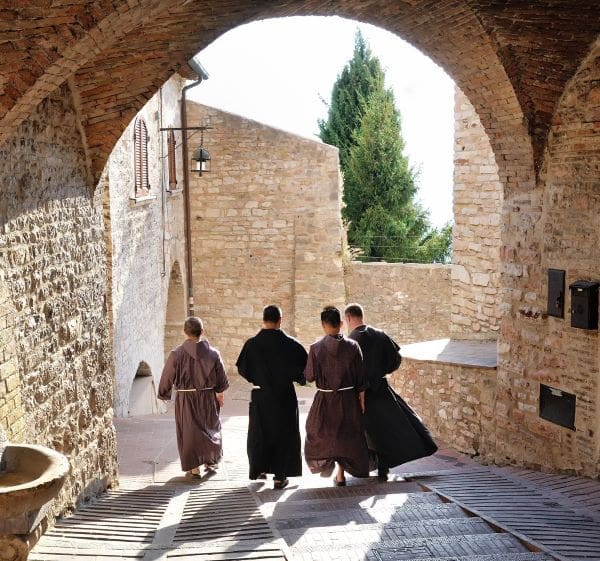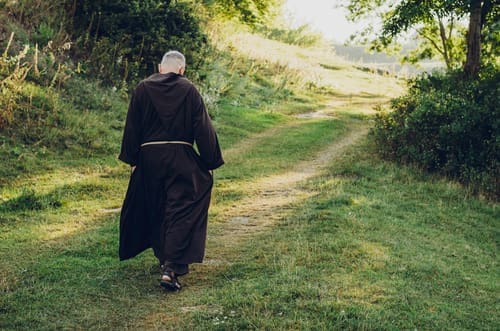Hello there, and welcome! I’m Resident Novice Sebastian Thomas.
When Br. Ricky asked me to unpack the chapters on monastic travel in The Rule of St. Benedict I gave a startled mew.
What feline really travels? Or even likes to travel?
Our “travel” is usually just to the vet. And we resist that venture by hiding or speeding around the house to illude capture.
Once in transport, most of us hiss and holler all the way. See the illustration.
Illus. Normally sweet and cuddly, Molly voices her opinion of travel.
“Yeowl!!”
Colin and Meg delighted to travel to Germany with their two children
Noice Master Br. Ricky patiently explained that many humans like to travel, and that Benedict offers some great travel instructions. We felines in the Cloister can help human travelers stay on that Benedictine road. Otherwise, travel can become a distraction on the all-important journey with God.
With a change of heart, I mewed my consent. I think that you’ll find Benedict’s travel practices helpful.
First, we’ll look briefly at two earlier monastic rules. Then we’ll concentrate on the Rule of St. Benedict. Benedict’s recommendations draw from a long line of monastic practice. Benedict didn’t pull all of his instructions “out of a hat.”
The Rule of Pachomius
Our Novice Scholar Little Jenny pointed me to monk named Pachomius, 290-346 CE. He is considered the founder of cenobitic life favored by Benedict (RB 1.13). (See “Cenobite” in the Glossary.) Pachomius wrote the first known monastic rule for the vast community that he founded. His nine monasteries for men and two for women together numbered over five thousand people! [1] Meow!
Here’s what the Rule of Pachomius says about travel.
On the Divine Office
“One shall not neglect the times of prayer and psalmody, whether he is on a boat, in the monastery, in the fields, or on a journey, or fulfilling any service whatever.” [2]
On Sharing Sights and Sounds
“Anyone who has been journeying by land or water, or working outside, shall not speak in the monastery about what he has seen happen there.” [3]
Pachomius looks worried. Is he concerned that
Br. Hilarion might see something unwholesome
on his travel to Scetis?
The Rule of the Master
The Rule of the Master was the main source for Benedict’s Rule.
My feline head ached when I read all that a traveling monastic needed to be aware of and do according to The Rule of the Master. The Master dedicated 9 chapters for keeping the Rule while traveling. [4] As I pawed through his instructions, I sensed that the Master was very much into rule-keeping. He wanted to spell out in detail exactly what the traveling brother was to do.
The Divine Office
The Master gives detailed regulations for doing the office while walking along the road. He makes it clear that “in no case may the Work of God be left out, but it is to be performed.” While the office was being recited, the monastics must stop, kneel, and bow at the appropriate times. Seems as if this would make travel pretty slow, but I guess speed wasn’t important. There was also to be no idle mewing during this recitation…“every word having nothing to do with God” was to be suppressed. [5]
Bottom line, if you are away from the monastery, you are still “in the monastery” in schedule and practice. It was important to honor one’s vows. Little Jenny mewed that she thought this approach could curb jealousy by the left-at-home brothers. Otherwise, they might think that the travelers were getting time “off the hook” or receiving special tasty treats.
One suggestion that I do like is that the monastic would “take with him a small book containing some readings” so that he can “do at least a little reading whenever he takes a rest along the way.” [6]
Prayers and the Travelling Monastic
The Master also includes two brief chapters with instructions that the monastic traveler ask the community to pray before he leaves and upon return. [7]
As we continue you’ll see that Benedict made extensive modifications and additions to what the Master had penned.
Contemporary monastics traveling
in Assisi, Italy, the home of St. Francis
Travel in the Rule of St. Benedict
Benedict addresses travel in two chapters:
Chapter 50 – Members Working At A Distance or Traveling
Chapter 67 – Members Sent On A Journey.
.
Chapter 50 – Members Working At A Distance Or Traveling
“Members who work so far away that they cannot return to the oratory at the proper time–and the prioress or abbot determines that is the case–are to perform the Opus Dei where they are, and kneel out of reverence for God.
So too, those who have been sent on a journey are not to omit the prescribed hours but to observe them as best they can, not neglecting their measure of service. “ RB 50.1-4
Benedict lines through all the details prescribed in the Rule of the Master. He first encourages travelers to include all the offices. Yet, he recognizes the reality – this may not be possible. “Do the best you can,” he instructs. “But do not be negligent in your practice.” Earlier in the Rule is wrote, “Indeed, nothing is to be preferred to the Opus Dei (the Work of God).” RB 43.3
Seems to me that he opts for granting the monastic travelers responsibility for themselves and for the commitment to their spiritual life. It is up to them to honor their promises as a monastic. They are not to temporarily opt out of their search for God
Observing the Opus Dei as best as they can connects the travelers to the community at home. They are joined together through prayer even if the times for the community prayer and the prayer of the travelers differ. In his scholarly tome, Benedict’s Rule in Mew: A Translation and Commentary, Feline Benedictine scholar Br. Terrence Sebastian Furlong, OSB-F, stressed this link between traveler and the community.
“The important thing is that the bond of prayer be maintained between those at home and those traveling
outside the motherhouse. If there is no bond of faithful prayer for one another, what reality is there to their community?” [8]
Purr. I love this and will share it with the Feline Cloister. We are linked together through prayer whether or not we are physically together. Mew!!
Jasper mews, “Do your best to have time for prayer.”
The Takeaway for Humans
Benedict stresses the importance of doing the Divine Office. Yet, he is realistic enough to “bend the rule” either for necessity or for human weaknesses.
What is your prayer routine at home? How might you continue or modify this routine when you travel? It is important to nurture that connection with God whether we are at home or on the road.
Chapter 67 – Monastics Sent on a Journey: Prayers Before Travel
“Members sent on a journey will ask the prioress or abbot and the community to pray for them. All absent members should always be remembered at the closing prayer of the Opus Dei.” RB 67.1-2
The member asks for prayers both before, during and after their journey. Why? “Contact with the world outside the monastery presented possible temptations, sights, and sounds that could draw members from their path to God and their fidelity to monastic life and the Rule. Therefore, the community would pray for members before departure, at each service of the Divine Office, and upon their return. Monastic communities today prayer for absent members.” [9]
Feline scholar Sr. Scholastica Muffin, OSB-F pawed,“ Prayer is the underlying continuum of life that keeps everything together; whether physically present or nor, all are held in that prayer.” [10]
The prayers of the community cover the monastic as they travel and when they return home.
Amma shared a wonderful example of prayer for others who are away. She mused, “When I was in high school I had a friend whose mother would bid us farewell with these words: ‘I’ll pray for you.’ I thought it a bit odd at the time but see now how it covered Katie and me with a special protective blessing.”
Br. Boniface Thickfur, OSB-F asking his community for prayers before travel…to the vet. Amma prays for the vet.
“I asked Br. Ricky and Sr. Nikki to pray for me while I travel, ” mews. Jasper. “They can pray for you, too. Just ask.”
The Takeaway for Humans
Benedict is concerned about the well-being of the monastic outside the cloister. Will what is seen, heard, and or done, undermine their spiritual journey? Benedict is concerned for us, too, as followers of the Rule. Will what we see, hear, and do undermine our own spiritual journey? Will you and I forget we are even on such a deep and beautiful journey while we are away?
I encourage you to ask for the prayers for traveling mercies from your friends and family, before and during your travel. When confronted with challenges knowing that you are held in prayer can help you retain your central identity in Christ and stay on that Benedictine road.
Should we be asked to pray for someone while they are away or traveling, we can strive to be faithful to that request and build the intercession into our daily prayer.
Chapter 67 – Monastics Sent on a Journey – Prayers at Journey’s End
“When they come back from a journey, they should, on the very day of their return, lie face down on the floor of the oratory at the conclusion of each of the customary hours of the Opus Dei. They ask the prayers of all for their faults, in case they may have been caught off guard on the way by seeing some evil thing or hearing some idle talk.” RB 67.3-4
Illus. Monastic lying face down –
Prostration
Chapter 67 – Monastics Sent on a Journey – Prayers at Journey’s End
“When they come back from a journey, they should, on the very day of their return, lie face down on the floor of the oratory at the conclusion of each of the customary hours of the Opus Dei. They ask the prayers of all for their faults, in case they may have been caught off guard on the way by seeing some evil thing or hearing some idle talk.” RB 67.3-4
Benedict says not to delay in asking for these prayers. Do them on the very day of the return. Perhaps the member HAS seen or heard or done something that was disturbing or had been challenged to step away from the Rule and its practices. Not intending to see or hear anything contrary to Christ and the Rule, the monastic could be caught off guard. Br. Terrence stresses this reality of travel.
“It is simply assumed that journeys are difficult, so everyone who returns from one gets a special blessing. Experience shows that only a strong and healthy monastic mentality can survive extensive traveling without disruption. Under the best conditions, routine is upset and a careful regimen of life is very hard to maintain on a journey.” [11]
Prayers by monastic confreres can calm the stress or guilt that the member may be feeling. And guilt, too. The member knows, then, that he or she is supported by the community.
Jasper plans to reflect on how glad he is that travel is over!
The Takeaway for Humans
Have you ever done something on a vacation or when traveling that you have regretted? Amma confesses that she most often gets impatient with situations, people and especially Prior John. Then she feels bad about it. Humans can become agitated when things don’t go as planned. Does this happen to you? What makes you lose your sense of peace and well-being when you travel?
I encourage you to reflect on your travel experiences when you return home. Is there anything that you regret? What might you have done differently? This is not to “beat oneself up” but to bring forward an occurrence and lay it to rest. Sharing with a trusted friend or spiritual guide can clear the air and free the mind and heart.
Chapter 67 – Monastics Sent on a Journey – Sharing the Travel Experience
“No monastics should presume to relate to anyone else what they saw or heard outside the monastery, because that causes the greatest harm. If any do so presume, they shall be subjected to the punishment of the rule.” RB 67.5-6
Notice that Benedict uses the word “greatest” in connection with the harm done by sharing – “Quia plurima destructio est.” I don’t mew in Latin, but just reading the Latin words makes my fur stand up. I sure don’t want to cause plurima destructio to others by relating all the troublesome details about my recent visit to the vet!
Benedict knows that sharing juicy tidbits of what was seen or heard or sharing details of experiences could cause jealousy, a determent to community. Certainly juicy tidbits can distract others as these hearers dwell on what they heard rather than on the Work of God or their lectio. It may also cause the listener to think judgmentally about the confessing member. This could lead to murmuring, another Benedictine prohibition.
At Left:
Sr. Bridgett, OSB-F, loves to tell all the gruesome details from her travels to the vet. Her confreres get depressed.
At Right:
Novice Sally is weary of hearing Sr. Bridgett mew about her travels.
That doesn’t mean that travelers should keep the details to themselves. Monastics are encouraged to share “sinful thoughts and wrongs committed in secret” with the superior. RB 7.44
If anything is shared there is to be punishment. Meow!! We don’t know what “the punishment of the rule” is here. Even scholar Br. Terrence Furlong pawed that discipline in the Rule “is almost always vague and hard to pin down.” [12] Perhaps discipline in the Rule is for another feline unpacking. I will share this idea with Br. Ricky.
Notice that Benedict uses the word “presume” twice here and will use the word again in verse 7. Presumption is to be avoided by members in the Rule. The use of the word “presume” is related to taking action without the approval of the abbot or prioress. FYI, Novice Little Jenny counted 31 uses of “presume” in the Rule.
“I don’t want my friends to get tired of my travel tales. I will just share a few things,” mews Jasper.
The Takeaway for Humans
We cloister felines don’t share the details of our visits to the vet. Perhaps if something disturbing happened on your trip it’s best not to share with others beyond a trusted friend or spiritual director.
Keep in mind, too, that most of the time people don’t want to hear all about all those fabulous places you’ve have been. Perhaps the listener will become jealous and grumble. To support healthy relationships and strong community bonds, please be discerning about what you share.
Sharing can clear the mind
and free the heart
Chapter 67 – Monastics Sent on a Journey – Avoid Presumption!
“So too shall anyone who presumes to leave the enclosure of the monastery, or go anywhere, or do anything at all, however small, without the order of the abbot or the prioress.” RB 67.7
The chapter ends on a rousing note of denunciation, not only towards those who leave the enclosure without permission but also those who do “anything at all, however small, without the order of the abbot or prioress.” Bottom line…
No Presumption!
Summing Up Benedictine Travel for Humans
I’m glad you’re still with me. Amma said that I got a bit carried away with all this, but it was really interesting. I sure hope all that I shared is helpful to you.
To sum it all up
– Do your best to continue your prayer routine when on vacation, modifying as necessary
– Before you depart, ask a friend, family member, church and/or church group to pray for you
– If a traveler asks you for prayer, be faithful in doing this offering
– Be discerning about what you share with others upon your return
I close with this additional mew about Benedictine travel.
Monastics would receive clothing “somewhat better than those they would normally wear.” These would be put back into the wardrobe after their journey’s end. (RB 55.14) Amma puts her new stuff back into her closet.
AND, monastics going on a journey “should get underclothing!” RB 55.13 Meeeow!
Have fun on your travels. Stay safe and follow the Benedictine Road.
Your friend,
Resident Novice Sebastian Thomas
P.S. I recommend Amma’s article on travel, “The Touch of God in Travel.” To reach the article, click here.
“Have a purrfect time on
your vacation,” mews Novice Sebastian Thomas
ENDNOTES
[1] Derwas J. Chitty, The Desert a City: An Introduction to the Study of Egyptian and Palestinian Monasticism under the Christian Empire (Crestwood, NY: St. Valdimer’s Seminary Press, 1999), 24.
[2] Armand Veilleux, Monk of Mistassini, trans. Pachomian Koinonia: Pachomian Chronicles and Rules, Volume 2 (Kalamazoo, MI: Cistercian Publications, 1981), Rule #142, p.166
[3] Veilleux, Rule #86, p160.
[4] Novice Sebastian found travel tidbits in chapters 56-61, 63, 66, 67.
[5] The Rule of the Master, trans Luke Eberle (Kalamazoo, MI: Cistercian Publications, 1977), RM 50.2, p. 221 and RM 56.20, p. 222.
[6] Ibid., RM 57.4-5, p. 223.
[7] Ibid., RM 66 & 67, p. 232.
[8] Terrence G. Kardong, Benedict’s Rule: A Translation and Commentary (Collegeville, MN: Liturgical Press, 1996), 563.
[9] Jane Tomaine, St. Benedict’s Toolbox: The Nuts and Bolts of Everyday Benedictine Living (Harrisburg. PA: Morehouse Publishing, 2015), 40.
[10] Esther de Waal, A Life-Giving Way: A Commentary on the Rule of St. Benedict (Collegeville, MN: The Liturgical Press, 1995), 10.
[11] Kardong, 564.
[12] Ibid., 565.



















